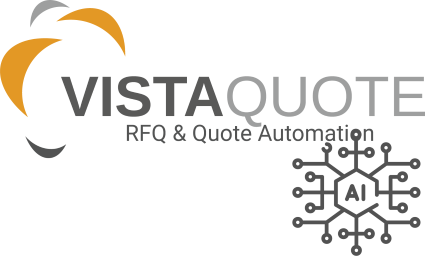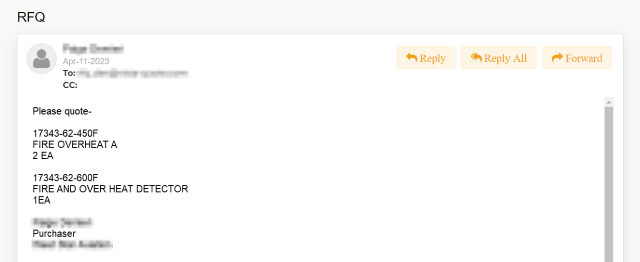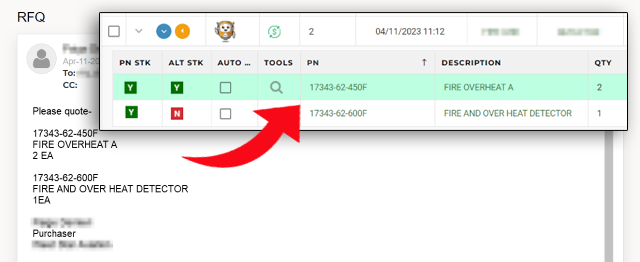When asked about why someone in the aviation aftermarket should be interested in AI technology, ChatGPT (an AI chatbot developed by OpenAI) responded “Those in the aviation aftermarket should be interested in AI because it has the potential to transform various aspects of their business. AI can help the aviation aftermarket improve operational efficiency, reduce costs, and enhance the customer experience, making it a worthwhile investment for those in the industry.”
Artificial Intelligence (AI) refers to the ability of machines to perform tasks that typically require human intelligence, such as understanding natural language, recognizing objects, making decisions, and learning from experience.
AI systems are designed to learn and improve over time by processing large amounts of data and using algorithms to identify patterns and make predictions. This allows them to perform a variety of tasks more accurately and efficiently than humans often can. Some familiar examples include virtual assistants, image and speech recognition software, and self-driving cars.
Cole Davisson, Vice President of Software Innovation at Ambry Hill Technologies estimates that “In the near future it’s very likely that companies using AI will have a distinct advantage over those who are not. Not just in the obvious benefits, but also that it will become a recognized and distinguishing value add in product or service offerings over those who are not embracing AI within their organizations.' He concludes, ‘You can either get there now and make it a significant competitive advantage, or don’t do it now, and risk falling into the shadow of those who have.”
The
Aviation Aftermarket
The aviation aftermarket refers to the business of providing products, parts, and services for aircraft after they have been sold by the original equipment manufacturer (OEM) and can involve everything from maintenance, repair, and overhaul (MRO) services to the sale of replacement parts, upgrades, and modifications. The size and type of parts are equally diverse in nature ranging from small components like bolts, screws, and light bulbs to larger systems such as engines, avionics, and landing gear.
Ambry Hill Technologies, a Cambridge, Minnesota based company ( ambryhill.com ) has been serving these industry sectors for many years and offers several business software solutions such as VistaSuite ( vista-suite.com ) and VistaQuote ( vista-quote.com ). The Ambry Hill customer base consisting of parts traders, resellers and MRO Part 145 Repair Stations is largely focused on the procurement and sale of various aircraft parts and components.
Aviation MRO can include a wide range of services such as engine maintenance and overhaul, avionics repair and replacement, painting, refurbishment, parts replacement, upgrades, and modifications, as well as routine inspections for any wear and tear, damage, or other issues that could affect an aircraft’s safety or performance.
The aviation aftermarket industry plays a crucial role in keeping aircraft safe, reliable, and efficient over their lifespan for passengers and crew. Its depth and diversity make it a perfect place to deploy Artificial Intelligent (AI) solutions to streamline processes, reduce man hours and increase productivity.
Artificial Intelligence in Aviation
Artificial Intelligence (AI) is being used in the aviation industry right now. In fact, the aviation industry has been an early adopter of AI technologies due to their potential to improve safety, efficiency, and customer experience.
Some
of the areas where AI is currently being used in the aviation industry include:
- Predictive
maintenance: AI is being used to analyze data from aircraft sensors to
predict when maintenance is needed before a component fails, reducing unscheduled
downtime and maintenance costs.
- Flight
planning and optimization: AI algorithms are used to optimize flight
routes, speed, and altitude to reduce fuel consumption and emissions while
maintaining safety and on-time performance.
- Air traffic
management: AI is being used to improve air traffic management systems,
reducing delays and improving safety by analyzing real-time data from aircraft
and other sources to optimize traffic flow.
- Customer service: AI-powered chatbots and virtual assistants are being used by airlines and airports to provide personalized customer service and improve the passenger experience.
Some
of the ways in which AI is being used in the aviation aftermarket include:
- Parts
inventory management: AI algorithms are used to analyze demand and usage
patterns to optimize inventory levels and reduce stockouts and excess
inventory.
- Parts
pricing and availability: AI-powered analytics are being used to analyze
market demand and pricing data to optimize parts pricing and improve parts
availability.
- Quality control: AI is being used to analyze data from inspections and tests to identify potential quality issues and improve overall product quality.
While the uses of artificial intelligence listed above span a range of important applications, Ambry Hill Technologies has identified an untapped opportunity for the use of AI within the aviation aftermarket sales and service sectors.
Outlined above are fine examples of how AI is currently utilized in the aviation industry, but a common thread throughout all those scenarios is how abstract and distant AI is from the end user. AI tends to be spoken of in terms of big data analytics, complex algorithms, and other background processes.
Ambry Hill Technologies is bringing artificial intelligence to the aviation aftermarket mainstream for the end user to work with directly. This breakthrough begins the same way nearly all aviation transactions typically start – with the request for quote (RFQ).
The
Typical Request for Quote (RFQ)
The Aviation Aftermarket sector is similar to trading stock shares in that the price of a part fluctuates based on a variety of factors. Because of this, firm/fixed pricing for aftermarket parts is not common. Therefore, a Request for Quote (RFQ) is used to request pricing information from potential suppliers before a purchase decision is made.
An RFQ serves as a clear and concise document that outlines the buyer's requirements and expectations for the supplier. By providing clear specifications and requirements, the RFQ helps to ensure that the supplier can deliver the requested goods or services to meet the buyer's needs.
RFQs might be in the form of phone calls because of an advertisement you published, direct messages from the inventory listing service you subscribe to, or manually typed email messages from an existing customer.
Ambry Hill brought the groundbreaking software called VistaQuote
( vista-quote.com)
to market three years ago to help manage aviation RFQs that are emailed from
inventory listing marketplaces, which eliminated the labor-intensive process of
manually copying information from a traditional RFQ email inbox over to a
separate quoting system.
Example: Typical RFQ
Using
AI to Automatically Process RFQs
The gap in technology, where AI is a perfect fit as a solution, is in the recognition and processing of the non-marketplace and non-listing service RFQs. VistaQuote has been great for processing marketplace and listing service RFQs, but what about the random RFQ emails typed by a human that is asking for availability and pricing?
Ambry Hill Technologies is pleased to announce that VistaQuote now uses the power of Artificial Intelligence (AI) to automatically understand and process human-typed, freeform emails into the Vista-Quote.com platform just like any other RFQ. This capability is available right now in VistaQuote and is a shining example of putting the power of AI directly in the hands of end-users to create real-world and practical benefits.
As Davisson explains, “VistaQuote already had the ability to auto-quote RFQs based on a feature-rich selection of customizable parameters. Now imagine pairing the auto-quoting with our AI recognition of human-typed RFQ emails. This exciting combination of AI and auto-quoting means that RFQ emails are recognized, interpreted, have the data extracted, are made into an RFQ within VistaQuote, and within seconds the customer will receive a quote without a human shepherding it throughout the entire process. Through VistaQuote’s AI-enabled RFQ quoting, we are empowering our customers with more time coverage and faster response rates because we can now make it all happen without waiting on a human to read the email.”
When the AI in VistaQuote successfully extracts the information from an email, VistaQuote can kick off a variety of automations like dispatching it to the appropriate salesperson, executing an export compliance check through Descartes 700+ restricted third-party databases, or check inventory availability. All this is to stage the RFQ/RFP for immediate action.
Paul Stewart, Founder and President of Ambry Hill Technologies states, “At Ambry Hill we are tenacious innovators and problem solvers, finding new ways of using technology to make real-world impacts today, not tomorrow.’ He continues, ‘Compared to the traditional way of processing RFQs and quotes with a regular email inbox, VistaQuote’s functionality is in class of its own. It’s an incredibly smarter and much more efficient way of separating out the things you don’t need to be concerned with. Employee time is a valuable resource for any company, and with VistaQuote’s AI engine and auto-quoting both enabled, our customers can focus on selling parts and services, not reading emails.”
See a demo of VistaQuote to learn more about how the practical use of artificial intelligence, auto-quoting, and more can be your new competitive advantage. Contact Ambry Hill Technologies by visiting AmbryHill.com/demo
About Ambry Hill Technologies
Ambry Hill Technologies is an innovative software company specializing in cloud-based and mobile business management applications that are purpose-built for the aviation aftermarket community. Ambry Hill’s software solutions are well-informed and thoughtfully designed.
Visit Ambry Hill Technologies online at ambryhill.com/products to learn more about VistaSuite Business Management Software, VistaQuote RFQ and Quote Automation, and VistaOne Database Consolidation Viewer. To contact someone at Ambry Hill directly, call 1-612-367-8472 or email sales@ambryhill.com.
The Ambry Hill Technologies headquarters
is located at 134 Adams Street South in Cambridge, Minnesota and is a wholly
owned subsidiary of AirT, Inc. (NASDAQ: AIRT), an industrious American holding
company established in 1980 and consists of more than 12 companies with over 600
employees.
 Reviewed by Ambry Hill Technologies
on
April 10, 2023
Rating:
Reviewed by Ambry Hill Technologies
on
April 10, 2023
Rating:







